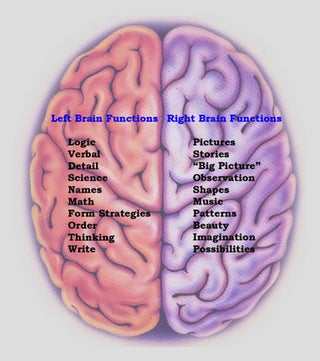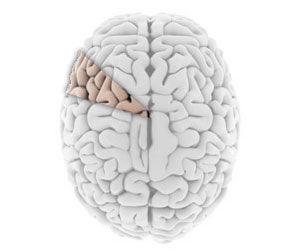. 
Adam Dachis
. Brain games will make you smarter! The internet is making you dumber! Alcohol is killing your brain cells! The brain is a mystery we've been trying to solve for ages, and the desire to unlock its secrets has led to vast amounts of misinformation. Many of these false notions are more widely believed than the truth. We took our healthy skepticism and a bunch of brain research to find the truth behind some of the most common myths about intelligence and our brains. Here's what we learned.
Photo by Igor Nazarenko (Shutterstock).
Myth 1: Left-Brained People Are Organized, Right-Brained People Are Creative
 Expand
Expand We're a stubborn people who become set in our ways, so it's no wonder we want to believe that our inclination towards creativity or organized thinking is decided at birth. The right- or left-brained myth suggests we're simply fulfilling a version of our genetic destiny and we should accept our strengths and weaknesses as part of who we are. But as Lisa Collier Cool points out in her article for Yahoo Health, we're not really right- or left-brained at all:
This myth began in the 1800s, where doctors discovered that injury to one side of the brain frequently caused loss of specific abilities. Brain scan experiments, however, show that the two halves of the brain are much more intricately linked than was originally thought, so problem-solving or creative tasks fire up activity in regions of both hemispheres of the brain, not just half. It is true that the right side of the brain controls the left side of the body and vice versa, so a right-brain injury can cause disability on the left side of the body.
More recently this myth has been used as an attempt to explain creativity, dyslexia, and even homosexuality in left-handed people, but the origin of the southpaw is still a mystery. Whether or not there is a compelling link between right- or left-handedness and specific common traits remains to be seen, but rest-assured that being more creative or more organized doesn't inhibit you from having a talent for both.
Myth 2: Your Memory Is An Exact Account of What You See and Experience
 Expand
Expand Some of us have better memories than others, but no memory is perfect. If you need proof, close your eyes and try to imagine the face of someone you know. In fact, try to imagine your own face. While you'll be able to conjure up a decent idea of the way you or anyone else looks, you won't be able to envision every last detail. This is because our memories don't recall anything we see, hear, sell, taste, or touch with much detail at all. Instead, as psychologist Dan Gilbert points out in his book Stumbling On Happiness, our brains record the seemingly necessary details and fill in the rest when it's time to remember:
[T]he elaborate tapestry of our experience is not stored in memory-at least not in its entirety. Rather, it is compressed for storage by first being reduced to a few critical threads, such as a summary phrase ("Dinner was disappointing") or a small set of key features (tough steak, corked wine, snotty waiter). Later, when we want to remember our experience, our brains quickly reweave the tapestry by fabricating-not by actually retrieving-the bulk of the information that we experience as a memory. This fabrication happens so quickly and effortlessly that we have the illusion (as a good magician's audience always does) that the entire thing was in our heads the entire time.
Gilbert's conclusions come from memory researcher Daniel Schacter, who believes the construction of memory is very similar to the way we imagine the future:
We have argued in recently that memory plays a critical role in allowing individuals to imagine or simulate events that might occur in their personal futures. We have further suggested that understanding memory's role in future event simulation may be important for understanding the constructive nature of memory, because the former requires a system that allows flexible recombination of elements of past experience, which may also contribute to memory errors.
While a little common sense and life experience can demonstrate the imperfections in your (and everyone else's) memory, Schacter's research points to two important things: we're no good at recalling past events or imagining the future because our process for doing either is essentially the same—at least as far as our brain functionality is concerned. While this points to much more of a problem than a solution, it certainly helps to remember that no memory is perfect and we're all designed to recall with error. Next time someone gets something wrong, it's at least worth remembering that.
Myth 3: You Only Use 10% of Your Brain
As with many myths, you can generally begin the debunking process by reminding yourself that the claim is pretty ridiculous. If we only used 10% of our brains, what's the point of the other 90%? According to myth-busting site Snopes, it was television that made us dumber:
In 1998, national magazine ads for U.S. Satellite Broadcasting showed a drawing of a brain. Under it was the caption, "You only use 11 percent of its potential." Well, they're a little closer than the ten-percent figure, but still off by about 89 percent. In July 1998, ABC television ran promotional spots for The Secret Lives of Men, one of their offerings for the fall season's lineup. The spot featured a full-screen blurb that read, "Men only use ten percent of their brains."
After that, champions of the paranormal used the 10% claim to explain the potential for psychic powers. It became fun to imagine the incredible potential available to us humans once we were able to unlock the remaining 90%. Unfortunately for superpower fans everywhere, we're already enjoying most of what our brains can currently offer. Lisa Collier Cool explains:
Brain imaging studies using PET scans and functional MRI show that any mentally complex activity uses many areas of the brain, and over a day, just about all of the brain gets a workout. More proof that the entire brain is crucial for daily life is the devastating impact of damage to even a small area of the brain. However, we do have some brain reserves. An autopsy study found that seniors who stay mentally active-through activities like reading the paper, going to the theater, or playing chess-are less likely to develop Alzheimer's disease-even if they have the characteristic physical brain changes typical of dementia, suggesting that mental function has a "use it or lose it" component. That allows people who keep their brain stimulated to develop more brain reserves, allowing them to continue functioning normally even as their brains are being damaged by Alzheimer's.
While you can't look forward to developing incredible superpowers with the help of rapid evolution, or any other crazy theory, you can keep yourself healthier later in life by simply staying mentally active. You may not be able to bend metal with your mind, but at least you'll stay coherent in your golden years.
Myth 4: Alcohol Kills Brain Cells
Just as we noted when debunking the myth that you only use 10% of your brain, a little bit of brain damage goes a long way. If you were actively killing brain cells when consuming alcohol, you'd notice some permanent side effects pretty quickly. Although alcohol does have a significant effect on your brain and body, brain damage isn't a given. You'll have to drink yourself into a coma to go that far.
What Alcohol Actually Does to Your Brain and Body
Alcohol, like caffeine, has an enormous reputation but loose understanding in popular culture. Le... Read more
The proof comes from a 1993 study by Grethe Jensen that matched brain samples from both (deceased) alcoholics and non-alcoholics and found no difference in the density of brain cells. (You can read more about this study here.) What alcohol actually does in inhibit the functionality of brain cells, and former Lifehacker writer Kevin Purdy explained it best:
What alcohol can and does do to your brain is affect the way your neurons get their firing triggers from glutamate. It infiltrates the glutamate receptors in your synapses, hurting their ability to send off their normal "fire" messages. Alcohol has this impact all across your brain—the parts that control muscles, speech, coordination, judgment, and so on. Keep that in mind the next time you or someone else claims that they drive, golf, or otherwise perform some task better with alcohol's help.
In the end, you just need to worry more about your choices than the lifespan of your brain.
Myth 5: The Internet Is Making Us Dumber
 Expand
Expand If you're familiar with the term "sweeping generalizations," this myth is one of them. Any claim that takes on a large entity and attempts to boil it down to a single, simplistic conclusions is bound to be wrong. This is how we end up with stereotypes. Claiming that the internet is making us dumber could have the glimmer of truth under specific circumstances, but so far no research points to any significant dumbing down of the sort.
The reason we find it easy to believe the internet is making us dumber is because, in some ways, it's making us less self-reliant. Our GPS devices navigate for us and we neglect to remember things because we have Google search. That doesn't make us dumber, necessarily, but rather causes us to rely more on what psychologist Daniel Wagner calls transactive memory. This type of memory is actually very useful because it allows us to, in essence, store more data in less space. Instead of remembering the contents of an entire article, we can simple remember the name or a few key words that we can entire into a search engine to pull it up.
How to Re-program Your Memory to Become More Self-Reliant
Modern conveniences like smartphones and the internet provide us with access to more information ... Read more
This comes with the obvious downside of lacking the full recall for actual information in your brain, which is why many people feel the internet is turning us into idiots. When our access is cut off, suddenly we're bereft of our knowledge because our transactive memories are rendered useless. The reality is, without actual proof that the internet is making us dumber, so far it appears that the entire idea hinges on the evolving manner in which we interact with and access information as opposed to any sort of fact, making this more of a cultural claim than a scientific one.
Myth 6: Listening to Classical Music Turns Babies into Geniuses
This myth began with a study conducted by Dr. Gordon Shaw and Dr. Frances Rauscher at UC Irvine in the early 90s. Preliminary results suggested that a specific piece of music composed by Wolfgang Amadeus Mozart boosted the spatial-temporal reasoning skills in young children. This made for big headlines and the creation of entire businesses surrounding the sale of Mozart-based products to mothers who wanted their children to become geniuses with the press of a play button. According to Brian Dunning of the podcast Skeptoid, the final results weren't quite so miraculous. He said, "although they had some promising preliminary results from a particular Mozart piece which made immediate worldwide headlines, the full study eventually showed no significant result." Likewise, in an in depth analysis on the Mozart Effect, Donna Lerch and Thomas Anderson concluded:
The music of Wolfgang Amadeus Mozart is both physically and aesthetically accessible to the general public. A number of studies have indicated that listening to Mozart's work may temporarily increase cognitive skills. Other studies have found no statistically significant "Mozart effect". It is unfortunate that the media and commercial ventures have taken the initial modest, unverified study and conjured up a pseudo-science which gave rise to, and which continues to promote, a full-blown industry.
Despite the readily available truth, the preliminary findings of this initial study were blown so far out of proportion that Mozart brain boost is one of the more stubborn myths still alive in our culture. If you like classical music, there's likely no harm in playing it for your child so long as you don't expect it to do any of the hard work for you.
Myth 7: Brain Games Make You Smarter
Wouldn't it be nice if we could actually boost our brain power by playing a few games on the bus ride to work? That's the promise the popular Nintendo DS title Brain Age made, starting a brain games trend that rages on. The BBC. . commissioned a study to test these claims and found that they didn't really make a difference:
More than 8,600 people aged 18 to 60 were asked to play online brain games designed by the researchers to improve their memory, reasoning and other skills for at least 10 minutes a day, three times a week. They were compared to more than 2,700 people who didn't play any brain games, but spent a similar amount of time surfing the Internet and answering general knowledge questions. Researchers said the people who did the brain training didn't do any better on the test after six weeks than people who had simply been on the Internet. On some sections of the test, the people who surfed the Net scored higher than those playing the games.
That isn't to say that practicing simple math—one of the games included in Brain Age—won't do you some good. We use simple math on a daily basis, after all. That said, look at any brain games you play as specific practice. You'll get better at that game, but don't expect any boost in your general intelligence.
Myth 8: Your IQ Is Fixed and Stays the Same Throughout Your Life
Your IQ, or intelligence quotient, is a score that's supposed to quantify your level of intelligence. What defines intelligence is still up for debate, so a high IQ isn't necessarily an accurate measurement, but it has long been assumed that our scores don't change—we're stuck at the level of intelligence we were born with. As you may have guessed, that's not true. Business Insider points to a few studies that show changes in IQ after just a few weeks of effort:
There's a lot of research supporting this theory. In one, "33 British students were given IQ tests and brain scans at ages 12 to 16 and again about four years later by researchers at the Wellcome Trust Centre for Neuroimaging at University College London; 9% of the students showed a significant change of 15 points or more in IQ scores," reports the Journal. And these changes weren't just due to measuring errors. The MRIs showed changes in gray matter - which are linked to IQ - says one of the study's co-authors, Cathy Price.
This is good news, because it seems that having a higher IQ is a good thing. People with a lower IQ (meaning in the 75 to 90 range) are more likely to wind up in prison, in poverty, or drop out of high school. A study conducted at the University of Delaware asserts that a higher IQ also has a correlation with higher social intelligence. Since IQ can change, these studies may not relate so much to people with higher scores but rather hardworking, studious individuals. Either way, there seems to be no harm in boosting your score and nothing barring you from doing so.
Myth 9: Your Brain Works Better Under Pressure
At some point in your life, you may have experienced a moment where you had an impossible deadline and somehow managed to finish your work—perhaps even exceptionally well. When the pressure is on, sometimes we find it in ourselves to pull through. Although a ticking clock can be an excellent motivator, as the looming consequences of missing a deadline can certainly get you working fast, it doesn't result in better brain performance. In fact, according to the Franklin Institute, pretty much any kind of stress makes it harder for your brain to function:
As science gains greater insight into the consequences of stress on the brain, the picture that emerges is not a pretty one. A chronic overreaction to stress overloads the brain with powerful hormones that are intended only for short-term duty in emergency situations. Their cumulative effect damages and kills brain cells.
In the end, if you believe you work better under pressure it's simply because the end result seems to justify that belief. Stress isn't enabling you to work better, but simply providing the motivation to get you to work in the first place. You'll be doing yourself a favor if you find a better way to get your work done before the clock starts ticking, but if you get stuck in a pinch at least there are a number of ways to keep the stress you're feeling to a minimum
![]()
![]()
![]()
![]()
![]()

![]()

























